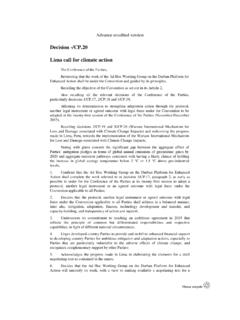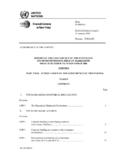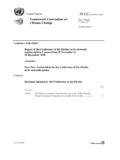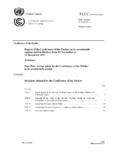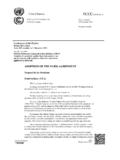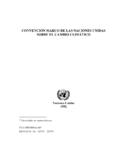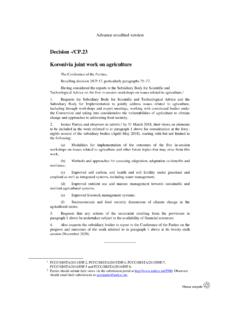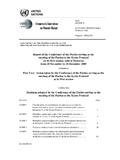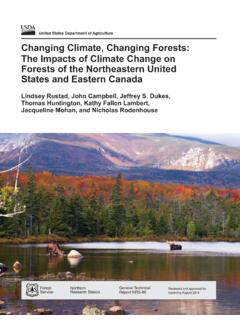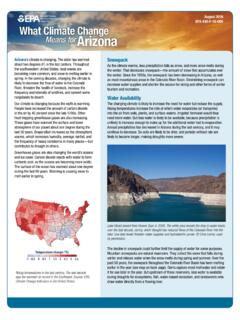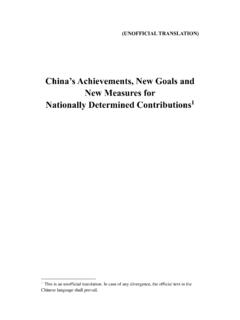Transcription of UNITED NATIONS FRAMEWORK CONVENTION ON CLIMATE …
1 1 UNITED NATIONS FRAMEWORK CONVENTIONON CLIMATE CHANGEUNITED NATIONS19922 UNITED NATIONS FRAMEWORK CONVENTION ON CLIMATE CHANGEThe Parties to this CONVENTION ,Acknowledging that change in the Earth's CLIMATE and itsadverse effects are a common concern of humankind,Concerned that human activities have been substantiallyincreasing the atmospheric concentrations of greenhouse gases,that these increases enhance the natural greenhouse effect,and that this will result on average in an additional warmingof the Earth's surface and atmosphere and may adversely affectnatural ecosystems and humankind,Noting that the largest share of historical and currentglobal emissions of greenhouse gases has originated indeveloped countries, that per capita emissions in developingcountries are still relatively low and that the share ofglobal emissions originating in developing countries will growto meet their social and development needs,Aware of the role and importance in terrestrial andmarine ecosystems of sinks and reservoirs of greenhouse gases, Noting that there are many uncertainties in predictionsof CLIMATE change , particularly with regard to the timing,magnitude and regional patterns thereof, Acknowledging that the global nature of CLIMATE changecalls for the widest possible cooperation by all countries andtheir participation in an effective and appropriateinternational response, in accordance with their common butdifferentiated responsibilities and respective capabilitiesand their social and economic conditions.
2 Recalling the pertinent provisions of the Declaration ofthe UNITED NATIONS Conference on the Human Environment,adopted at Stockholm on 16 June 1972,Recalling also that states have, in accordance with theCharter of the UNITED NATIONS and the principles ofinternational law, the sovereign right to exploit their ownresources pursuant to their own environmental anddevelopmental policies, and the responsibility to ensure thatactivities within their jurisdiction or control do not causedamage to the environment of other states or of areas beyondthe limits of national jurisdiction,Reaffirming the principle of sovereignty of states ininternational cooperation to address CLIMATE change ,Recognizing that states should enact effectiveenvironmental legislation, that environmental standards,management objectives and priorities should reflect theenvironmental and developmental context to which they apply,3and that standards applied by some countries may beinappropriate and of unwarranted economic and social cost toother countries, in particular developing countries,4 Recalling the provisions of General Assembly resolution44/228 of 22 December 1989 on the UNITED NATIONS Conference onEnvironment and Development, and resolutions 43/53 of6 December 1988, 44/207 of 22 December 1989, 45/212 of21 December 1990 and 46/169 of 19 December 1991 on protectionof global CLIMATE for present and future generations ofmankind,Recalling also the provisions of General Assemblyresolution 44/206 of 22 December 1989 on the possible adverseeffects of sea-level rise on islands and coastal areas.
3 Particularly low-lying coastal areas and the pertinentprovisions of General Assembly resolution 44/172 of19 December 1989 on the implementation of the Plan of Actionto Combat Desertification,Recalling further the Vienna CONVENTION for theProtection of the Ozone Layer, 1985, and the Montreal Protocolon Substances that Deplete the Ozone Layer, 1987, as adjustedand amended on 29 June 1990,Noting the Ministerial Declaration of the Second WorldClimate Conference adopted on 7 November 1990,Conscious of the valuable analytical work being conductedby many states on CLIMATE change and of the importantcontributions of the World Meteorological Organization, theUnited NATIONS Environment Programme and other organs,organizations and bodies of the UNITED NATIONS system, as wellas other international and intergovernmental bodies, to theexchange of results of scientific research and thecoordination of research,Recognizing that steps required to understand and addressclimate change will be environmentally, socially andeconomically most effective if they are based on relevantscientific, technical and economic considerations andcontinually re-evaluated in the light of new findings in theseareas,Recognizing that various actions to address climatechange can be justified economically in their own right andcan also help in solving other environmental problems,Recognizing also the need for developed countries to takeimmediate action in a flexible manner on the basis of clearpriorities, as a first step towards comprehensive responsestrategies at the global, national and, where agreed, regionallevels that take into account all greenhouse gases.
4 With dueconsideration of their relative contributions to theenhancement of the greenhouse effect,Recognizing further that low-lying and other small islandcountries, countries with low-lying coastal, arid and semi-arid areas or areas liable to floods, drought and5desertification, and developing countries with fragilemountainous ecosystems are particularly vulnerable to theadverse effects of CLIMATE change ,6 Recognizing the special difficulties of those countries,especially developing countries, whose economies areparticularly dependent on fossil fuel production, use andexportation, as a consequence of action taken on limitinggreenhouse gas emissions,Affirming that responses to CLIMATE change should becoordinated with social and economic development in anintegrated manner with a view to avoiding adverse impacts onthe latter, taking into fullaccount the legitimate priority needs of developing countriesfor the achievement of sustained economic growth and theeradication of poverty,Recognizing that all countries, especially developingcountries, need access to resources required to achievesustainable social and economic development and that, in orderfor developing countries to progress towards that goal, theirenergy consumption will need to grow taking into account thepossibilities for achieving greater energy efficiency and forcontrolling greenhouse gas emissions in general, includingthrough the application of new technologies on terms whichmake such an application economically and socially beneficial,Determined to protect the CLIMATE system for present andfuture generations,Have agreed as follows:7 ARTICLE 1 DEFINITIONS *For the purposes of this CONVENTION :1.
5 "Adverse effects of CLIMATE change " means changes in thephysical environment or biota resulting from climatechange which have significant deleterious effects on thecomposition, resilience or productivity of natural andmanaged ecosystems or on the operation of socio-economicsystems or on human health and " CLIMATE change " means a change of CLIMATE which isattributed directly or indirectly to human activity thatalters the composition of the global atmosphere and whichis in addition to natural CLIMATE variability observedover comparable time " CLIMATE system" means the totality of the atmosphere,hydrosphere, biosphere and geosphere and "Emissions" means the release of greenhouse gases and/ortheir precursors into the atmosphere over a specifiedarea and period of "Greenhouse gases" means those gaseous constituents ofthe atmosphere, both natural and anthropogenic, thatabsorb and re-emit infrared "Regional economic integration organization" means anorganization constituted by sovereign states of a givenregion which has competence in respect of mattersgoverned by this CONVENTION or its protocols and has beenduly authorized, in accordance with its internalprocedures, to sign, ratify, accept, approve or accede tothe instruments "Reservoir" means a component or components of theclimate system where a greenhouse gas or a precursor of agreenhouse gas is "Sink" means any process, activity or mechanism whichremoves a greenhouse gas, an aerosol or a precursor of agreenhouse gas from the "Source" means any process or activity which releases agreenhouse gas.
6 An aerosol or a precursor of a greenhousegas into the * Titles of articles are included solely to assist 2 OBJECTIVEThe ultimate objective of this CONVENTION and any relatedlegal instruments that the Conference of the Parties may adoptis to achieve, in accordance with the relevant provisions ofthe CONVENTION , stabilization of greenhouse gasconcentrations in the atmosphere at a level that would preventdangerous anthropogenic interference with the CLIMATE a level should be achieved within a time-frame sufficientto allow ecosystems to adapt naturally to CLIMATE change , toensure that food production is not threatened and to enableeconomic development to proceed in a sustainable 3 PRINCIPLESIn their actions to achieve the objective of theConvention and to implement its provisions, the Parties shallbe guided, inter alia, by the Parties should protect the CLIMATE system for thebenefit of present and future generations of humankind, on thebasis of equity and in accordance with their common butdifferentiated responsibilities and respective , the developed country Parties should take thelead in combating CLIMATE change and the adverse specific needs and special circumstances ofdeveloping country Parties, especially those that areparticularly vulnerable to the adverse effects of climatechange, and of those Parties, especially developing countryParties, that would have to bear a disproportionate orabnormal burden under the CONVENTION , should be given Parties should take precautionary measures toanticipate, prevent or minimize the causes of CLIMATE changeand mitigate its adverse effects.
7 Where there are threats ofserious or irreversible damage, lack of full scientificcertainty should not be used as a reason for postponing suchmeasures, taking into account that policies and measures todeal with CLIMATE change should be cost-effective so as toensure global benefits at the lowest possible cost. Toachieve this, such policies and measures should take intoaccount different socio-economic contexts, be comprehensive,cover all relevant sources, sinks andreservoirs of greenhouse gases and adaptation, and compriseall economic sectors. Efforts to address CLIMATE change maybe carried out cooperatively by interested Parties have a right to, and should, promotesustainable development. Policies and measures to protect theclimate system against human-induced change should beappropriate for the specific conditions of each Party andshould be integrated with national development programmes,taking into account that economic development is essential foradopting measures to address CLIMATE Parties should cooperate to promote a supportive andopen international economic system that would lead tosustainable economic growth and development in all Parties,particularly developing country Parties, thus enabling thembetter to address the problems of CLIMATE change .
8 Measurestaken to combat CLIMATE change , including unilateral ones,should not constitute a means of arbitrary or unjustifiablediscrimination or a disguised restriction on Parties, taking into account their common butdifferentiated responsibilities and their specific nationaland regional development priorities, objectives andcircumstances, shall:(a)Develop, periodically update, publish and makeavailable to the Conference of the Parties, inaccordance with Article 12, national inventories ofanthropogenic emissions by sources and removals bysinks of all greenhouse gases not controlled by theMontreal Protocol, using comparable methodologies tobe agreed upon by the Conference of the Parties;(b)Formulate, implement, publish and regularly updatenational and, where appropriate, regional programmescontaining measures to mitigate CLIMATE change byaddressing anthropogenic emissions by sources andremovals by sinks of all greenhouse gases notcontrolled by the Montreal Protocol, and measures tofacilitate adequate adaptation to CLIMATE change ;(c)Promote and cooperate in the development,application and diffusion, including transfer, oftechnologies, practices and processes that control,reduce or prevent anthropogenic emissions ofgreenhouse gases not controlled by the MontrealProtocol in all relevant sectors, including theenergy, transport, industry, agriculture, forestryand waste management sectors.
9 (d)Promote sustainable management, and promote andcooperate in the conservation and enhancement, asappropriate, of sinks and reservoirs of all11greenhouse gases not controlled by the MontrealProtocol, including biomass, forests and oceans aswell as other terrestrial, coastal and marineecosystems;(e)Cooperate in preparing for adaptation to the impactsof CLIMATE change ; develop and elaborateappropriate and integrated plans for coastal zonemanagement, water resources and agriculture, and forthe prot


